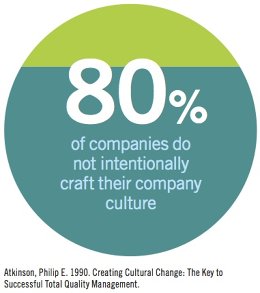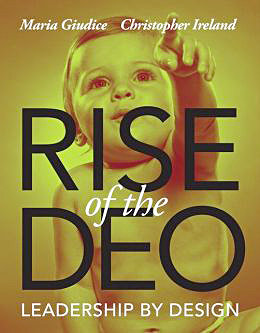Some believe company culture can be mandated from the top down. Some believe it emerges on its own from the bottom up. A Design Executive Officer, or DEO, sidesteps this debate. He knows it must be built–iteratively, collaboratively, and over time–from the inside out.

Culture is the unique collection of beliefs and practices that communicates a company’s values, whether or not they’ve been formalized or articulated. A well-designed culture unites stakeholders in a shared understanding of “the right thing to do.” It becomes the unseen but firmly rooted infrastructure that coaches new hires and comforts old-timers. It’s the force that attracts like-minded talent and repels those with different attitudes or behaviors. A positive company culture can boost growth, while a negative or mediocre one can speed failure.
A DEO recognizes the power of company culture, but that’s not the primary reason he embraces and builds it. For a DEO, crafting an effective, authentic, and meaningful company culture is neither a choice nor a checklist item. It’s a straightforward reflection of who he is and why he wants to lead. A strong company culture reflects the DEO’s own beliefs and behavior.
Company culture is highly subjective in its origin and evolutionary development; no template exists. In fact, copied or commanded culture is inherently dysfunctional. A culture must emerge from and accurately embody a company’s people and processes. There is, however, a progression that DEOs initiate.
Purpose
Ask a DEO to build her ideal company culture, and she’ll almost always start with its purpose. She’ll want to make it clear not only what the company does, but also what higher commitment it serves. If this purpose is captured in a mission statement it won’t be a bland functional promise like “Lead in customer satisfaction, product quality, and employee happiness,” but rather a more daring, sincere, and consequential statement like that from shoe and eyewear maker, Toms:
With every product you purchase, Toms will help a person in need. One for One.
This mission doesn’t spell out exactly how the company’s culture operates, but it provides distinct guidance and a clear ethic for making decisions. It’s scaffolding on which the company can layer operations, marketing, sales, or financial directives. It’s source code that can be carefully edited as the company grows and changes.
Pace and Drive
In shaping company culture, a DEO strives to support creativity and curiosity. He wants a philosophy that encourages collaboration and rewards useful risk-taking, not as attributes of selected people or departments but as characteristics of the entire company. He knows these attributes need to be baked into the culture from the top down and from the bottom up. He knows these attributes thrive in an environment that feels open, approachable, transparent, and genuine.
A DEO can’t completely control every detail of a healthy company culture, but he’ll set the company in motion, determining whether development is “fast and furious” or “slow and steady.” He’ll bolster admired activities and work to eliminate undesired ones. He’ll model how he expects others to deal with deadlines, stress, and setbacks.
People
As a company grows and matures, its culture becomes more independent and more shared. Defining characteristics of collaborators and partners may be spelled out explicitly, but they are confirmed and elaborated through the company’s actions. The company’s “ideal” employee takes shape through daily interactions and becomes more recognized as an important component of the culture. As Ayah Bdeir, founder of littleBits explains:
We’re a culture of people driven by a passion for our mission and for what we do. Because we’re driven by our passion to help others be creative, we accept that a solution can come from anyone–it can come from me or an intern or from user feedback. It doesn’t matter. We only care about finding the best solution to the problem.
Of course, some behaviors or qualities that are valued initially lose favor over time. A startup can honestly say, “We will share all job responsibilities.” A company of 10,000 employees cannot. On the other hand, some people-centered practices that seem unusual at first can become increasingly important over time. Companies that promoted work-life balance used to be considered naive or New Age, but in this “always on” era, work and home life blend. This once-ridiculed consideration now enjoys much wider acceptance.
Ambiance
A DEO will obsess over the physical environment and office ambiance because she sees them as proxies for cultural values. She knows that the office space influences everyone’s mood and mindset on a daily basis. She knows that the lobby makes a first impression on visitors and that conference rooms communicate the company’s attitude toward collaboration. She knows that the company’s brand isn’t limited to its logo, website, or packaging; it can be communicated in the office layout, in the whiteboard pen colors, in the noise level.
Because of this, a DEO may spend months searching for the right office space. She may fret over the food or restroom supplies. She may lie awake rethinking the company email signature–not to get it perfect, but to ensure that it accurately communicates the company’s core attributes.
Evolution

As the culture becomes ingrained and widely embraced, the truckload of details that shapes it will no longer need a DEO’s constant oversight. An employee handbook may document the ideals, but the culture is reinforced without a rulebook. Over time, stakeholders can sense if something is out of sync with the company’s norms. They’ll point out discrepancies and add complementary elements. They’ll become the keepers of the culture.
Strong company cultures evolve and change over time. DEOs know that a company culture can’t stay fixed, but instead must respond to external changes as well as internal pressures. Each crisis, each opportunity is a chance to examine the company culture. Perhaps it can provide immediate and clear guidance. Perhaps it fuels heated debates. Perhaps it is silent. If it’s been thoughtfully articulated and widely shared, the corporate culture finds a seat at every meeting
via 80% Of Companies Don’t Care About Company Culture–Do You? | Fast Company | Business + Innovation.
80% Of Companies Don"t Care About Company Culture - Do You?
